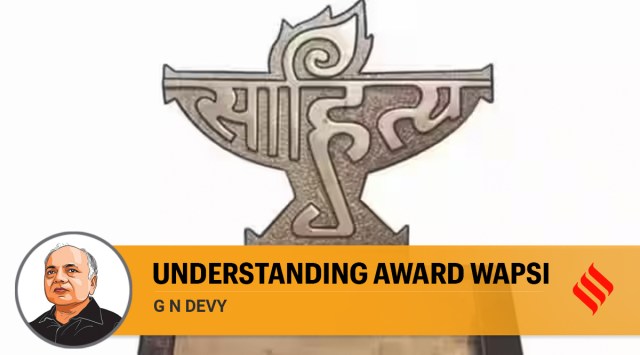
MM Kalburgi was assassinated at his residence in Dharwad on August 30 2015. The murder shocked the country and triggered a country-wide intellectual protest. It was a protest against growing intolerance. Supporters of the government mistook it as an anti-government protest. It was variously dubbed as a “manufactured protest”, “move to spread disaffection towards the state”, “Congress-induced protest” and “insult to the nation”. No one in the authorities made any attempt to understand from the writers, dramatists and film-makers who had returned their awards why they were returning the awards earned for their talent and creativity.
In February 2017, a question was asked in Lok Sabha by the BJP’s Om Birla to find out if the government was aware that many writers had returned their awards since 2015, and how many? And, did they “accept the government’s request to take back the awards”? The Culture Minister at that time was Mahesh Sharma. Sumitra Mahajan was the Lok Sabha Speaker.
The minister’s reply included a list of writers: (Hindi) — Uday Prakash, Ashok Vajpeyi, Krishna Sobti, Mangalesh Dabral, Kashinath Singh, Rajesh Joshi; (English) — GN Devy, Nayantara Sahgal, Keki Daruwalla; (Gujarati) — Anil Joshi; (Punjabi) — Waryam Singh Sandhu, Surjit Patar, Jaswinder, Gurbachan Bhullar, Atamjit Singh, Baldev Singh, Darshan Buttar, Ajmer Singh Aulakh, Mohan Bhandari; (Rajasthani) — Nand Bhardwaj, Ambika Dutt; (Kannada) — Kum Veerabhadrappa, Rahamat Tarikere, Devanuru Mahadeva; (Kashmiri) — Ghulam Nabi Khayal, Marghoob Banihali; (Urdu) — Munawwar Rana, Khaleel Mamoon; (Malayalam) — Sara Joseph; (Assamese) — Homen Borgohain, Nirupama Borgohain; (Telugu) — Katyayani Vidmahe; and Translation Prize – (Hindi) — Chaman Lal; (Kannada) – GN Ranganatha Rao; (Marathi) — Ibrahim Afghan. Also the Yuva Puraskar — (English) — Aman Sethi; (Punjabi) — Pargat Singh Satauj; Bal Sahitya Puraskar — (Telugu) — M Bhoopal Reddy.
The minister stated: “Yes, Madam… The writers claimed that there was an attack on their freedom of expression and the Akademi kept silent on the issue.” He went on to say, “The Akademi had convened a special Executive Board meeting on 23.10.2015 and 17.12.2015 in which Resolution had been passed requesting the writers to reconsider their decision.” He did not mention that, in the first place, the Sahitya Akademi Awards are not government awards but given by an “autonomous body of writers, entirely run by writers. Nor did he elaborate on what ‘the issue’ was on which the Sahitya Akademi had maintained silence according to the writers who had returned the awards. No one need be surprised that he did not mention the murders of Narendra Dabholkar, Govind Pansare and MM Kalburgi. Six months later, Gauri Lankesh was assassinated in Bangalore, September 5, 2017. No need, also, to be shocked that many TV channels ridiculed the writers and kept depicting them as persons who had expressed their “disavowal and disaffection towards the State,” a phrase that the age-old “sedition law” had coined.
Almost a century ago, in protest against the Jallianwala Bagh massacre, India’s greatest modern writer, Rabindranath Tagore, had returned the King George honour given to him for his contribution to literature, making him “Sir Rabindranath”. In his letter to the Viceroy, he had stated, “the time has come when badges of honour make our shame glaring in their incongruous context of humiliation, and I for my part wish to stand, shorn of all special distinctions, by the side of those of my countrymen, who, for their so-called insignificance, are liable to suffer a degradation not fit for a human being”. That was during British Rule; and his act was not seen as an act of sedition.
Several BJP leaders mocked returning of the awards as “a manufactured protest”, a phrase brought into currency by the late Arun Jaitley. Writers tried to repeatedly state that there was no “hidden manufacturer” of their protest. The poet Keki N Daruwalla made it a point to stress in his letter to the president of Sahitya Akademi: “I wish to make it clear that I have no party leanings… the landscape that confronts the writer today is bleak… Faces will continue to be blackened with paint and painters like MF Husain will be forced into exile. A writer like Taslima Nasreen will have to leave Kolkata under a leftist regime. Statesmen will continue to be praised for their nationalism ‘despite’ the fact they are Muslim. Mob murders will continue to be described as accidents.”
This was, more or less, the strain in all of the statements issued by writers who returned their honours. The question of political affiliation was immaterial in this unique phenomenon. What mattered was their emphasis on increased intolerance in social life. In my statement sent to the Sahitya Akademi, I had said, “Writers and thinkers have come forward to rescue sense, good-will, values, tolerance and mutual respect… The great idea of India is based on a profound tolerance for diversity and difference. They far surpass everything else in importance.”
In 1964, Jean Paul Sartre declined to accept the Nobel Prize for Literature given to him. None of the official records of the Swedish Academy or French government have ever censured Sartre. They understand that writers and artists function as the conscience of the people and have the courage to challenge the state.
The Parliamentary Committee Report recently tabled in the Parliament shows the utter failure of the current regime in understanding the autonomy of the artist’s conscience. We have reason to feel glad that at least one member of the Committee recorded dissent. If the recommendations made by the Committee get implemented in future, India should never hope to see another Tagore. If “Commitment to the State” takes precedence over the “call of conscience”, the idea of democracy and freedom of thought will have no chance of existence.
The writer is Obaid Siddiqi Chair Professor and an award winning writer in English, Marathi and Gujarati